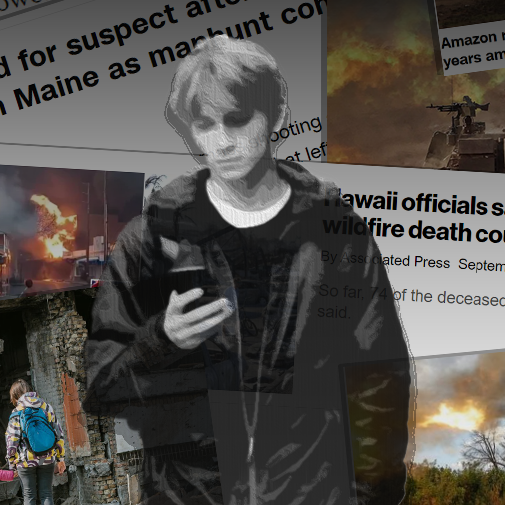“This is the way that it is / This is the way that it always will be / This is the way and it makes me sick,” sings 23-year-old Peter McPoland in his 2023 song “Digital Silence,” a frustration-laced tune about the modern world. McPoland expresses what it means to be a teen in the 21st century: angry at the world we live in, and desensitized to both violence and society’s failure to protect us from tragedy after tragedy.
My generation — Generation Z — has grown up in a media wasteland plagued by a 24-hour news cycle of click-bait headlines that use tragedies for advertising dollars. We’re expected to react to the ever-increasing stories of violence, to get angry, to do something to change things, then to brace ourselves for the next headline to hit our TikTok feeds.
Yet, when we don’t take action, we’re described as apathetic, of being digitally obsessed and having “a sense of carelessness towards the world.” But teens are actually hard-wired to care — their bodies have a “natural emotional reaction of distress… [and] physical reaction to violence.” Why, then, is Gen Z criticized for being “lazy” and “unmotivated”? Why does it seem to others that this generation of young people cares the least about what’s happening around them?
We appear apathetic because we’re bombarded daily with the statistics — how many bodies of our peers are victims of shootings (1,157 teens have died from gun violence this year); how many teenagers fall into addiction (teen overdose deaths have risen exponentially since 2020); and how much of the environment is destroyed each year by humans.
It’s hard enough to manage our day-to-day anxieties and omnipresent threats of violence and drug addiction; teenagers shouldn’t also be inundated with headlines shouting at us to “wake up” with each catastrophe. It’s overwhelming and we’re tired of it.
But most of all, we’re scared. We’re terrified of a potential dystopia. We’re afraid of a crumbling environment, a failing economy, rampant gun violence — issues we’re expected to fix, but without the power to really change anything.
(Compounding the feeling of hopelessness: the cost of four-year public and four-year private colleges have nearly tripled,“ and homeownership is all but impossible due to “skyrocketing home prices,” inflation, and record-high interest rates.)
These conditions have made us fear adulthood. We want a sense of safety and a future we can look forward to, but when we’re constantly under the gun (literally and figuratively), we shut down and retreat within ourselves or seek solace in safe spaces online. Feeling too much all the time — too much anger, too much sadness, too much fear — leads to desensitization, which creates generational apathy.
Reacting to each new crisis exhausts our emotional reserves. When these tragedies are addressed by aging lawmakers with only “thoughts and prayers” instead of action — to curb gun violence, to protect the environment — we’re both dismayed by the inaction and frustrated at our lack of power to enact real change. (Despite some youth activists impacting government decisions, there is only one Gen Z member of Congress, Florida’s Maxwell Frost, and the average age in the U.S. senate is 65-years old. We do not yet wield significant lawmaking power.)
“If [we] cared about everything, [we’d] exhaust [our] capacity for caring,” Psychology Today states. Teens in 2023 are familiar with this claim. We know that caring for every disaster will burn us out. The options are either to fall apart, take up figurative arms with the little time and energy we have, or hold ourselves together with a (false) sense of control, so feigning apathy is our way of taking control of the situation — if we don’t act scared, it can’t hurt us.
It’s time to remind parents, teachers, and other generations that teenagers are not apathetic because of disinterest in world events. We’re overwhelmed because of the events out of our control that we’re expected to fix and can’t. It’s not our fault if we feel guilty for not doing “enough” to stop the crises currently plaguing the planet. Our desensitization is the tragedy that media outlets don’t talk about; it’s a result of pressures we shouldn’t have to endure.
I want my generation to know that if we feel jaded towards each new headline, that’s fair, and I understand.
Defeating the evils of the world was never our job to begin with.



